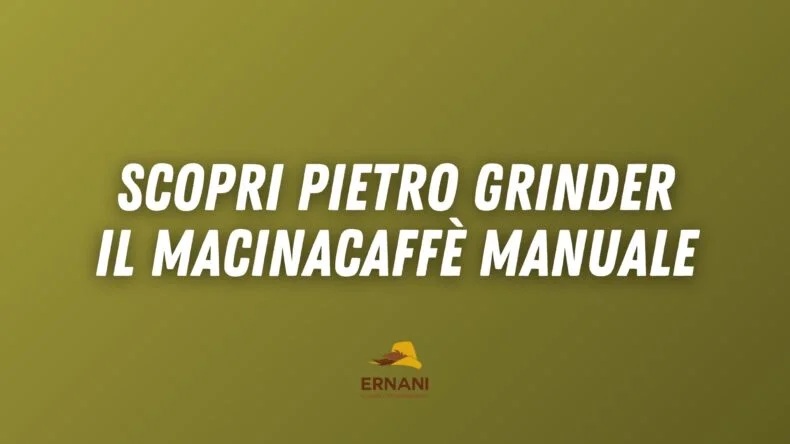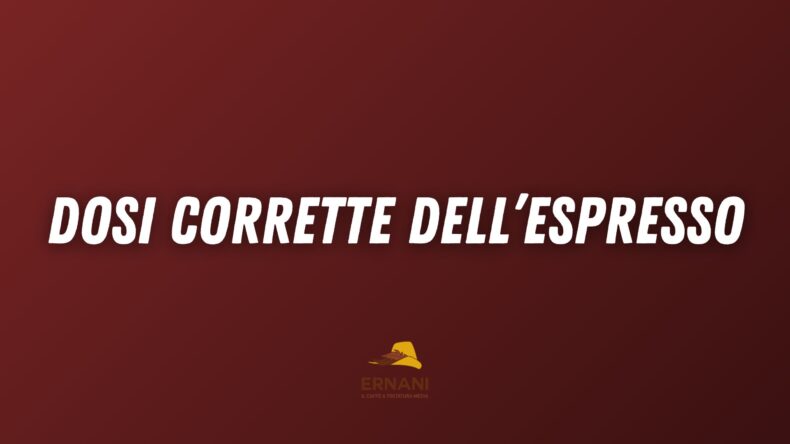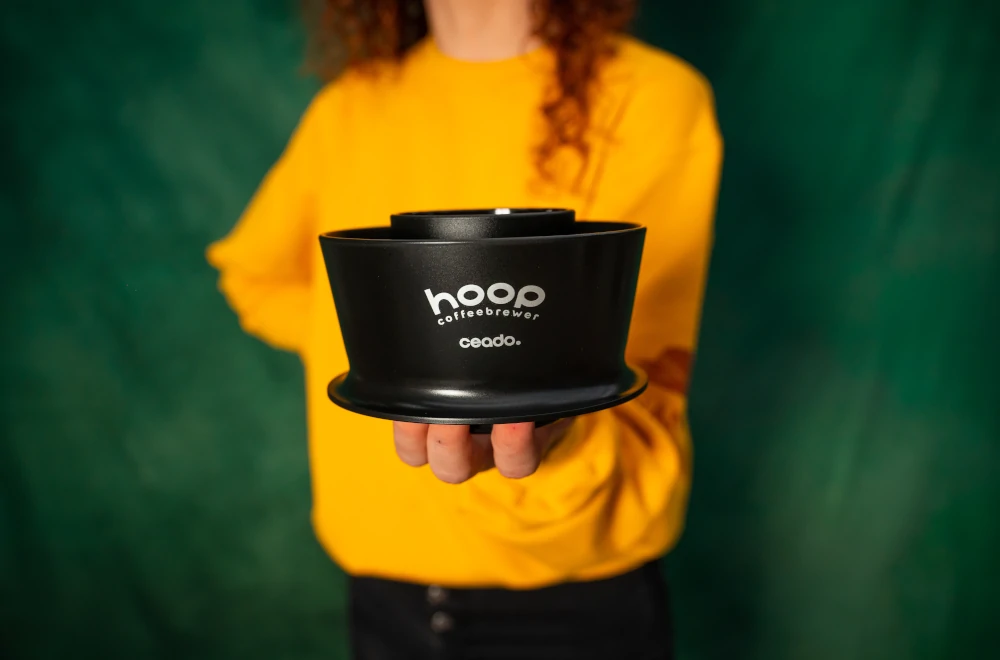
After having told and explained the preparation of coffee with the Moka, the Espresso, the Aeropress, the French Press, the Chemex, the Siphon, the Clever, the V60, the Cold Brew Dripper, the Brew Bottle and the Napoletana…
Today I present to you Hoop, the latest addition to the family of Brewing methods!
Hoop, as mentioned, is a brand new tool, presented for the first time at the Sigep fair in Rimini in January 2022!
It is a simple and intuitive coffee maker, which uses the percolation method, perfect for anyone who wants to approach paper filter methods for the first time ever, but still does not have great knowledge or all the necessary tools.
P.S. The term “brewing” includes all the tools used to prepare coffee as an alternative to espresso. First of all we can remember the moka, followed by the Neapolitan and then all the other methods with paper filter, such as the V60, or the metal filter, such as the French Press.
Introducing Hoop
Hoop was patented by Marco Flores of the Ceado company, an innovative company dedicated to the creation of super professional lines of coffee grinders and much more for the service of bars and kitchens.
The objective was to create a Brewing method that was truly simple and intuitive, within the reach of anyone, even those who were approaching this world for the first time ever, but at the same time offering a result that was anything but banal.
In fact, Hoop does not require many tools, but only a paper filter, which can also be purchased from Ceado, but can also be replaced with those from Aeropress.
It does not even require great skills from the operator, as the pouring phase is simplified to the maximum and the instrument independently takes care of the mixing and percolation of the water through the ground block.
So to summarize, to make coffee with Hoop you will need:
- Hoop
- Round paper filter
- Balance
While you can eliminate the electric kettle with a gooseneck spout specific for Brewing and the server can be replaced by a simple mug.
Hoop structure
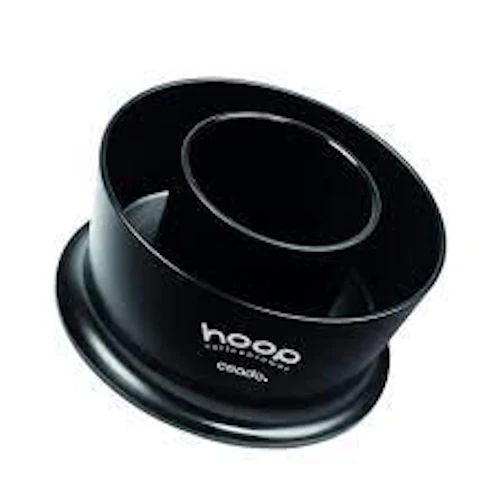
The tool, as mentioned above, is very simple
It is in fact made up of two cylinders, a smaller internal one and a larger external one, which fit together thanks to a screw system at the base.
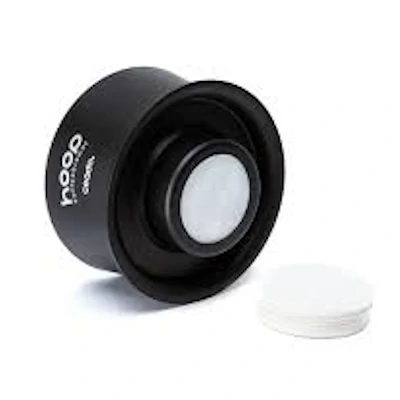
Right where the two parts are screwed, the round filter also fits together, as you can see in the next photo.
Finally, on the lower edge of the smaller cylinder there are small holes that allow the water to pass through and therefore percolate through the ground coffee.
What does percolation mean?
Without being too academic or technical, percolation is a principle of coffee extraction.
It occurs when water filters through a block of ground coffee without any pressure and, drop after drop, reaches a container placed underneath the instrument.
Let’s imagine what happens for espresso coffee: I insert the ground coffee into the filter, attach the filter holder to the machine and start the extraction. Then the water will pass through the ground coffee to arrive in our cup.
The difference, however, lies in the fact that the water for espresso has a considerable pressure, which can even reach 12 bars. On the contrary, in percolation methods, the water that filters through the coffee has no pressure other than the force of gravity alone.
This extraction method is therefore more delicate, thus allowing us to obtain a more fragrant, acidic and sweet coffee, in which bitterness is almost, if not completely, absent.
Hoop extraction
The Brew Ratio, i.e. the dose of coffee in relation to water, is 60 g of coffee per 1 L of water; in this case we will prepare the dose for a mug, using 15g of coffee for 250 ml of water.
The coffee must be ground coarsely, therefore coarser than that used for the moka. To be precise, the grain size should be between 600 and 800 microns.
Preparation steps:
- First separate the two cylinders;
- Place the filter on the base of the instrument;
- Hook the two cylinders together until we hear a shrill sound, which will make us understand that the paper filter is secure and tight and will not risk falling into the container below during extraction;
- Meanwhile, heat the water to around 93°C (do some experiments with your coffee to understand the ideal temperature, staying between 90 and 95°C);
- Pour hot water onto the filter to start heating the instrument and eliminate any odorous paper residue;
- Empty the instruments from the water;
- Pour the ground coffee into the smaller cylinder and tap the side a few times to level it;
- Now pour the water into the outer cylinder;
- All you have to do is wait for the tool to work its magic and finish the extraction in about 3 minutes!
NB. If the water takes more than 3 minutes to pass through the grounds, it means that the coffee is ground too fine and therefore the drink will be over-extracted.
On the contrary, if it takes less than 3 minutes then the coffee is ground too loosely and the drink will be under-extracted.
If you still have any doubts, watch the video below!
Which coffee to use?
What has been said so far is trueonly if you use high quality coffee with a medium or medium-light roast.
In fact, you can pay all the attention in the world to make an excellent coffee, but if you select a dark roasted ground coffee, produced starting from green coffees with aromatic defects and no merits, the result will always be a bitter cup with notes of rubber, wood and empyreumatic (burnt), if not even worse!
Then select a premium single-origin arabica, relying on roasters, like us at Caffè Ernani, who take care of the bean in every aspect, from the plant to the final service.
Then choose a washed coffee if you prefer more delicate aromas accompanied by good acidity, or opt for natural ones if you want to obtain greater sweetness.
Here are the single origins of Caffè Ernani
Discover the intense and well-defined taste of a fine single-origin!
Do you want to practice with this method and also discover all the other brewing techniques and tools?
We are waiting for you at the Ernani Academy Brewing course!
Fill out the form below to request information on courses, without any kind of obligation!



